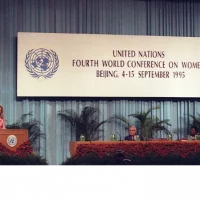Since Panama’s independence from Colombia in 1903, the Panama Canal had been a dramatic and ongoing point of discussion. The United States had engineered Panamanian independence from Colombia when it did not want to pay higher construction fees proposed by the Colombian and French companies building the canal; the new country then signed a treaty… Read More "The Fight to Ratify the Panama Canal Treaty"
“If there is one message that echoes forth from this conference, let it be that human rights are women’s rights and women’s rights are human rights once and for all.”—First Lady Hillary Rodham Clinton At the United Nations’ 4th World Conference on Women, which was held from September 4-15, 1995, several countries united in support… Read More "The Beijing Conference on Women"
Life Under Il Duce
Charismatic, admired, and feared, Benito Mussolini came to power in 1922, when he became the youngest Prime Minister in Italian history. After destroying all political opposition through his secret police and outlawing labor strikes, Mussolini and his fascist followers consolidated their power through a series of laws that transformed the nation into a one-party dictatorship. Within… Read More "Life Under Il Duce"
“It wasn’t supposed to happen here” — 9/11, Before and After
September 11, 2001 left an indelible mark on American history when nineteen members of al Qaeda carried out the deadliest attack on American soil since Pearl Harbor. After hijacking four planes, the terrorists flew two into the Twin Towers of the World Trade Center, while a third struck the Pentagon, killing more than two thousand… Read More "“It wasn’t supposed to happen here” — 9/11, Before and After"
“A Recipe for Endless War” – The Rise of the Taliban
After conquering Kabul in April 1996, the Taliban established the ultra-conservative Islamic Emirate of Afghanistan, enforcing a radical interpretation of Islamic law which severely curtailed individual social and religious freedoms, especially for women. Because of its radical policies, its massive violation of human rights, and abysmal failure to provide basic governmental services, the Taliban were… Read More "“A Recipe for Endless War” – The Rise of the Taliban"
Blessed — An Encounter with Mother Teresa
Born in Albania on August 26, 1910, Anjezë Gonxhe Bojaxhiu, later known as Mother Teresa, devoted the majority of her life to serving India as a teacher, nurse, missionary and head of a major charitable organization. After joining the Sisters of Loreto as a young woman, Sister Teresa traveled to India and worked as a… Read More "Blessed — An Encounter with Mother Teresa"
Breaking Chains: The Continual Fight Against Human Trafficking
In October 2000, 135 years after the Thirteenth Amendment officially abolished slavery within the United States, Congress declared that “as the 21st century begins, the degrading institution of slavery continues throughout the world.” These opening words to the Victims of Trafficking and Violence Protection Act embodied the United States’ growing awareness of modern slavery and… Read More "Breaking Chains: The Continual Fight Against Human Trafficking"
The Embassy Moscow Fire of 1977
Diplomats working in the USSR had to contend with a wide range of difficulties – poor bilateral relations, KGB surveillance, tough living conditions, Russian winters. For those serving in 1977, you could add one more thing to that list – a massive fire. On the evening of August 26th, U.S. Embassy Moscow erupted in flames.… Read More "The Embassy Moscow Fire of 1977"
North Korea and U.S. Violation of International Waters
For much of military history, combatants of all nationalities have operated under the guidance of an ancient adage: all’s fair in love and war. Unfortunately, even with the advent of maritime law and international conventions on the conduct of war, countries continue to commit violations of one kind or another during times of conflict, such… Read More "North Korea and U.S. Violation of International Waters"
End of an Era: The August Coup and the Final Days of the Soviet Union
In August 1991, Soviet hardliners attempted to overthrow the progressive Mikhail Gorbachev, Secretary General of the Communist Party, in a desperate attempt to save the collapsing Soviet Union. Declaring a state of emergency, eight government officials named themselves the State Committee on the State of Emergency (GKChP) and forcibly detained Gorbachev in the Crimea, where… Read More "End of an Era: The August Coup and the Final Days of the Soviet Union"

